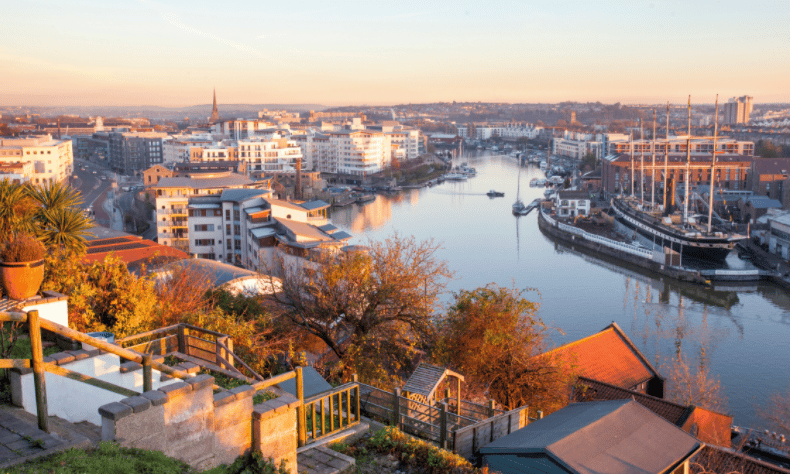A second wave of major transport improvements is being proposed to make it easier to walk, cycle and use public transport as part of work to cut air pollution and support social distancing in Bristol.
Earlier this year, the Mayor of Bristol unveiled plans to accelerate existing transport ambitions to improve walking, cycling and bus journeys in the city centre and help Bristolians get around safely during the pandemic.
Since then the council has moved quickly to pedestrianise the Old City area and close Bristol Bridge to general traffic, as well as installing new temporary bike lanes in the city centre and widening pavements across the city.
Bristol City Council, in partnership with the West of England Combined Authority, has now applied for further government funding to extend and strengthen the temporary work already done. Additional proposals to work with the community and close several neighbourhood roads to through traffic have also been put forward.
The long-term ambition is to make these changes permanent as part of the transformation of Bristol’s transport network, with new road layouts that create cleaner air and better bus, walking and cycling journeys, alongside ongoing plans for a mass transit public transport system.
Mayor Marvin Rees said:

We are taking bold action to create a better, more connected future for everyone and to help Bristol emerge from this crisis in a more inclusive and sustainable way.
By diverting traffic away from our community hubs, we will protect public health and unlock barriers to inclusive economic growth with cleaner air, safer and better public transport, and improved walking and cycling routes for everyone.
These major transport improvements were already in the pipeline, but the coronavirus means we needed to accelerate the plans to support social distancing.
The pandemic has had huge impacts on our usual travel habits and, despite its challenges, we saw air pollution levels drop by almost half during the months of lockdown with big increases in walking and cycling.
We want to capture those benefits and protect the long-term public health of the city as well as the viability of our public transport services that provide real value to our communities.
This next phase will strengthen the new schemes and we will be talking to communities across the city to determine the next steps for creating more liveable neighbourhoods that are free from traffic congestion and pollution.
Phase two of post-COVID-19 transport improvements:
Extensions of work already done in phase one:
Temporary arrangements will be improved to strengthen the schemes, such as replacing barriers with semi-permanent bollards, for the following schemes:
- Old City pedestrianisation
- Lewins Mead bike lane
- Upper Maudlin Street, Park Row, Marlborough Street and Colston Street bike lanes (including changes to St Michael’s Hill junction to ban the left turn onto St Michael’s Hill from Perry Road and to ban the right turn out of St Michael’s Hill onto Perry Road)
- Clifton Triangle bike lane (including a bus stop bypass to better integrate Queen’s Road bus stops)
New cycling improvements:
- Nelson Street – new protected bike lane and improvements to pedestrian crossing facilities
- New high quality, on-street, secure cycle shelters across the city for residents in flat or terraced apartments.
Proposed new road closures:
The council will consult with the local community on the following proposed road closures and discuss the various options available before anything is implemented.
The proposals would retain access to the roads but prevent through traffic using them by closing one end. This would give local businesses and residents more space to use the roads, and provide safer walking and cycling routes.
Roads under consideration:
- St Mark’s Road, Easton
- Clifton Village
- Beaufort Road/Victoria Avenue, Redfield
- Mina Road, St Werburghs
- Cotham Hill
- Greville Road/Upton Road, Southville
- Langton Court Bridge, St Anne’s
- Rosemary Lane, Eastville
- Redcliffe Mead/Prewett Street, Redcliffe
- Overton Road, Bishopston
- Picton Street, Montpelier
- Dean Lane, Southville
- Woodland Road, Clifton
Many of these closures have been suggested by locals using the online interactive map that was launched to get ideas from the community following the announcement of phase one. Further engagement with the various communities will take place before plans are finalised.
Cllr Kye Dudd, Cabinet Member for Transport, added:

Right across Bristol we have been making walking and cycling routes more attractive and this next exciting phase will build on the work done so far.
Many of the new ideas have been submitted by the public during the pandemic and we would like to thank everyone who made a suggestion for how to improve transport and neighbourhoods in the city.
We will be engaging with communities to assess the new proposals, which are being recommended to protect public health in both the long and short term by reducing pollution and supporting social distancing.
There will inevitably be a period of adjustment as we all adapt to the important changes that we have already put in place and those that are emerging. But it is crucial that we make big changes to create more efficient travel and reliable bus services in and around the city.
We would encourage people to get out and explore the new dedicated walking and cycling routes we are providing and we are keen to hear from communities on both the impacts of the changes so far and feedback on the new proposals.
Work on phase two is anticipated to start in winter, with the schedule led in part by the community feedback as plans are confirmed, developed and finalised.
The interactive mapping tool for people to make comments is available at: www.bristol.gov.uk/covidtransport.
